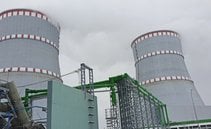During the presidential visit, an agreement was also announced between the French nuclear group Orano and Mongolian partners to develop a uranium mine.

During Mongolian President Ukhnaagiin Khurelsukh’s five-day visit to France, a lithium exploration agreement was announced between the two countries. This agreement was celebrated less than six months after President Emmanuel Macron’s visit to Ulaanbaatar. Mongolia currently exports nearly 80% of its goods to China and is increasing trade with Russia. However, the country is determined to diversify its trade relations beyond its neighbors, China and Russia, and reduce its dependence on them.
France will invest 400,000 euros (about $422,000) through its BRGM geological service to search for lithium in Mongolia. Explorers have identified a land basin in Mongolia that may contain rich reserves of lithium. Critical metals like lithium are essential in the global transition to clean energy and greener transportation, such as electric vehicles, to address the climate crisis.
During the presidential visit, an agreement was also announced between the French nuclear group Orano and Mongolian partners to develop a uranium mine within the Badrakh Energy holding. It is estimated that this mine could account for 4% of global uranium supplies.
France has recently faced difficulties in its uranium supply due to the coup in Niger, from which the European country obtains much of the critical metal needed to fuel its fleet of nuclear reactors. Relations between Paris and Niamey were compromised by these events.
Another agreement announced by the French authorities provides financial support from France for Mongolia’s purchase of a communications satellite from the French company Thales Alenia Space.
As is also the case in Central Asia, Western powers are trying to increase their influence in Mongolia and increase trade and investment, against a backdrop of geopolitical changes linked to events such as the Russian invasion of Ukraine. Mongolia is generally in favor of discussing expanding economic relations with the United States and European nations, but how much of this discussion will turn into action remains to be seen. Mongolian Prime Minister L. Oyun-Erdene visited Washington DC in August, where he met with US Vice President Kamala Harris.
Areva Mines, now part of Oran, has been involved in the exploration of the Dornogovi province for uranium since 1997. According to the World Nuclear Association, the Zoovch Ovoo deposit has resources of more than 54,000 tonnes of the precious gray metal.
In 2015, nuclear cooperation between France and Mongolia took a step forward with the creation of Badrakh Energy. The joint venture is controlled by Oran subsidiary Areva Mongol (66%), while Erdenes Mongol of Mongolia, through its subsidiary Monatom, holds 34%.
Erdenes Mongol estimates investing around one billion euros in 22 years, with an expected profit of 5.5 billion euros. Orano estimates that a two-year pilot deal with new mining processes, starting in 2021, will generate 20 tons of uranium.
Western nations would like to completely eliminate dependence on Russian uranium, in an effort to inflict heavy economic damage on Moscow in response to its war in Ukraine.
Both France and the United States have declared interest in assisting Mongolia in the extraction of critical minerals, including rare earth elements (REEs).
Original article published on Money.it Italy 2023-10-21 07:00:00. Original title: La Francia a caccia di litio e uranio in Mongolia






